Macroeconomic Policy: Impact on Economic Welfare and Challenges
VerifiedAdded on 2023/06/13
|9
|3226
|261
Report
AI Summary
This report provides a detailed analysis of macroeconomic policies, focusing on their impact on economic welfare. It explores various policies, including fiscal, monetary, and exchange rate policies, highlighting their advantages and disadvantages. The report also addresses fundamental economic concepts and the challenges faced by the UK government over the past decade, offering suggestions for improvement. Key issues such as unemployment and inflation are examined, along with their effects on individuals and businesses. The report concludes by emphasizing the importance of macroeconomic policies in promoting economic growth and stability, and how platforms like Desklib can aid students in understanding these complex topics through access to solved assignments and past papers.
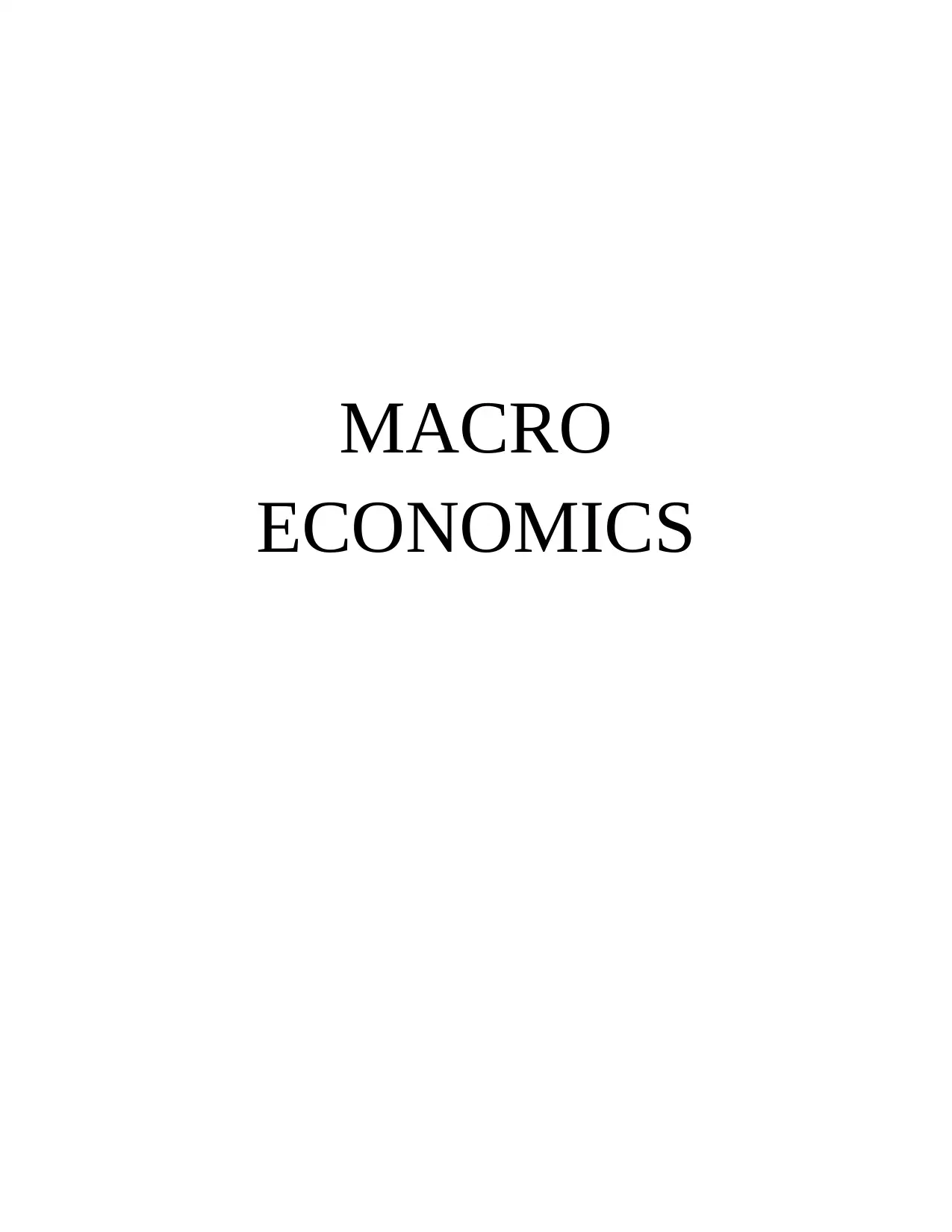
MACRO
ECONOMICS
ECONOMICS
Secure Best Marks with AI Grader
Need help grading? Try our AI Grader for instant feedback on your assignments.
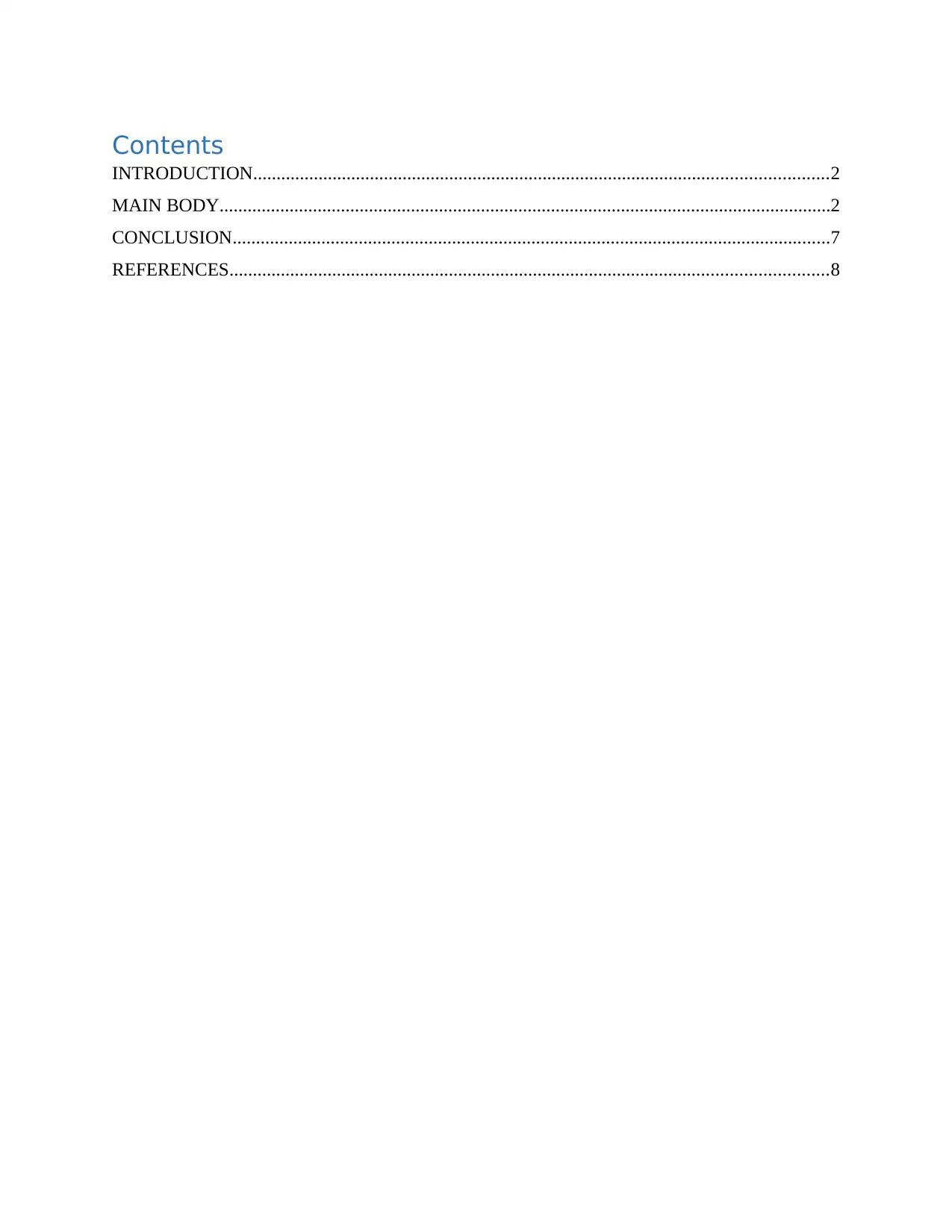
Contents
INTRODUCTION...........................................................................................................................2
MAIN BODY...................................................................................................................................2
CONCLUSION................................................................................................................................7
REFERENCES................................................................................................................................8
INTRODUCTION...........................................................................................................................2
MAIN BODY...................................................................................................................................2
CONCLUSION................................................................................................................................7
REFERENCES................................................................................................................................8
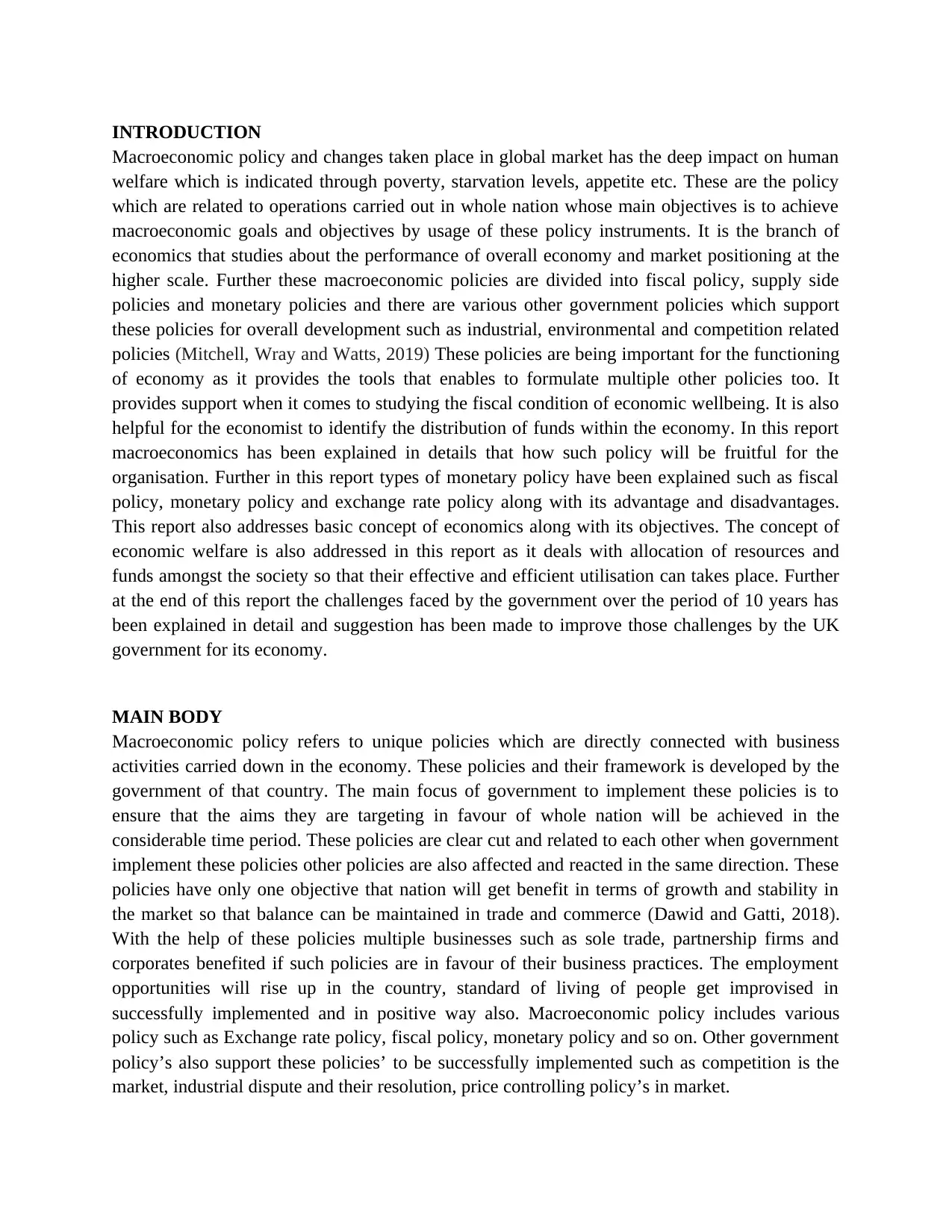
INTRODUCTION
Macroeconomic policy and changes taken place in global market has the deep impact on human
welfare which is indicated through poverty, starvation levels, appetite etc. These are the policy
which are related to operations carried out in whole nation whose main objectives is to achieve
macroeconomic goals and objectives by usage of these policy instruments. It is the branch of
economics that studies about the performance of overall economy and market positioning at the
higher scale. Further these macroeconomic policies are divided into fiscal policy, supply side
policies and monetary policies and there are various other government policies which support
these policies for overall development such as industrial, environmental and competition related
policies (Mitchell, Wray and Watts, 2019) These policies are being important for the functioning
of economy as it provides the tools that enables to formulate multiple other policies too. It
provides support when it comes to studying the fiscal condition of economic wellbeing. It is also
helpful for the economist to identify the distribution of funds within the economy. In this report
macroeconomics has been explained in details that how such policy will be fruitful for the
organisation. Further in this report types of monetary policy have been explained such as fiscal
policy, monetary policy and exchange rate policy along with its advantage and disadvantages.
This report also addresses basic concept of economics along with its objectives. The concept of
economic welfare is also addressed in this report as it deals with allocation of resources and
funds amongst the society so that their effective and efficient utilisation can takes place. Further
at the end of this report the challenges faced by the government over the period of 10 years has
been explained in detail and suggestion has been made to improve those challenges by the UK
government for its economy.
MAIN BODY
Macroeconomic policy refers to unique policies which are directly connected with business
activities carried down in the economy. These policies and their framework is developed by the
government of that country. The main focus of government to implement these policies is to
ensure that the aims they are targeting in favour of whole nation will be achieved in the
considerable time period. These policies are clear cut and related to each other when government
implement these policies other policies are also affected and reacted in the same direction. These
policies have only one objective that nation will get benefit in terms of growth and stability in
the market so that balance can be maintained in trade and commerce (Dawid and Gatti, 2018).
With the help of these policies multiple businesses such as sole trade, partnership firms and
corporates benefited if such policies are in favour of their business practices. The employment
opportunities will rise up in the country, standard of living of people get improvised in
successfully implemented and in positive way also. Macroeconomic policy includes various
policy such as Exchange rate policy, fiscal policy, monetary policy and so on. Other government
policy’s also support these policies’ to be successfully implemented such as competition is the
market, industrial dispute and their resolution, price controlling policy’s in market.
Macroeconomic policy and changes taken place in global market has the deep impact on human
welfare which is indicated through poverty, starvation levels, appetite etc. These are the policy
which are related to operations carried out in whole nation whose main objectives is to achieve
macroeconomic goals and objectives by usage of these policy instruments. It is the branch of
economics that studies about the performance of overall economy and market positioning at the
higher scale. Further these macroeconomic policies are divided into fiscal policy, supply side
policies and monetary policies and there are various other government policies which support
these policies for overall development such as industrial, environmental and competition related
policies (Mitchell, Wray and Watts, 2019) These policies are being important for the functioning
of economy as it provides the tools that enables to formulate multiple other policies too. It
provides support when it comes to studying the fiscal condition of economic wellbeing. It is also
helpful for the economist to identify the distribution of funds within the economy. In this report
macroeconomics has been explained in details that how such policy will be fruitful for the
organisation. Further in this report types of monetary policy have been explained such as fiscal
policy, monetary policy and exchange rate policy along with its advantage and disadvantages.
This report also addresses basic concept of economics along with its objectives. The concept of
economic welfare is also addressed in this report as it deals with allocation of resources and
funds amongst the society so that their effective and efficient utilisation can takes place. Further
at the end of this report the challenges faced by the government over the period of 10 years has
been explained in detail and suggestion has been made to improve those challenges by the UK
government for its economy.
MAIN BODY
Macroeconomic policy refers to unique policies which are directly connected with business
activities carried down in the economy. These policies and their framework is developed by the
government of that country. The main focus of government to implement these policies is to
ensure that the aims they are targeting in favour of whole nation will be achieved in the
considerable time period. These policies are clear cut and related to each other when government
implement these policies other policies are also affected and reacted in the same direction. These
policies have only one objective that nation will get benefit in terms of growth and stability in
the market so that balance can be maintained in trade and commerce (Dawid and Gatti, 2018).
With the help of these policies multiple businesses such as sole trade, partnership firms and
corporates benefited if such policies are in favour of their business practices. The employment
opportunities will rise up in the country, standard of living of people get improvised in
successfully implemented and in positive way also. Macroeconomic policy includes various
policy such as Exchange rate policy, fiscal policy, monetary policy and so on. Other government
policy’s also support these policies’ to be successfully implemented such as competition is the
market, industrial dispute and their resolution, price controlling policy’s in market.
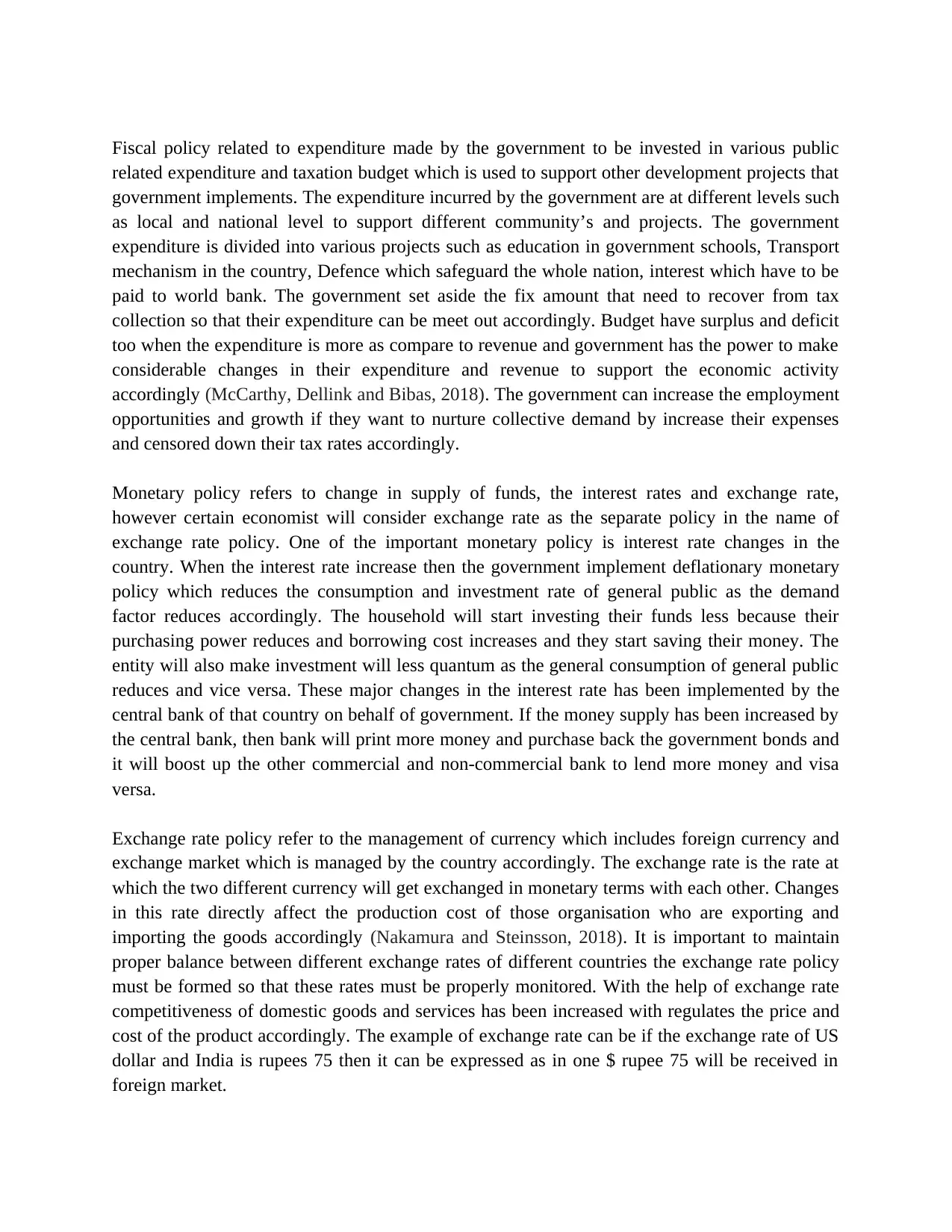
Fiscal policy related to expenditure made by the government to be invested in various public
related expenditure and taxation budget which is used to support other development projects that
government implements. The expenditure incurred by the government are at different levels such
as local and national level to support different community’s and projects. The government
expenditure is divided into various projects such as education in government schools, Transport
mechanism in the country, Defence which safeguard the whole nation, interest which have to be
paid to world bank. The government set aside the fix amount that need to recover from tax
collection so that their expenditure can be meet out accordingly. Budget have surplus and deficit
too when the expenditure is more as compare to revenue and government has the power to make
considerable changes in their expenditure and revenue to support the economic activity
accordingly (McCarthy, Dellink and Bibas, 2018). The government can increase the employment
opportunities and growth if they want to nurture collective demand by increase their expenses
and censored down their tax rates accordingly.
Monetary policy refers to change in supply of funds, the interest rates and exchange rate,
however certain economist will consider exchange rate as the separate policy in the name of
exchange rate policy. One of the important monetary policy is interest rate changes in the
country. When the interest rate increase then the government implement deflationary monetary
policy which reduces the consumption and investment rate of general public as the demand
factor reduces accordingly. The household will start investing their funds less because their
purchasing power reduces and borrowing cost increases and they start saving their money. The
entity will also make investment will less quantum as the general consumption of general public
reduces and vice versa. These major changes in the interest rate has been implemented by the
central bank of that country on behalf of government. If the money supply has been increased by
the central bank, then bank will print more money and purchase back the government bonds and
it will boost up the other commercial and non-commercial bank to lend more money and visa
versa.
Exchange rate policy refer to the management of currency which includes foreign currency and
exchange market which is managed by the country accordingly. The exchange rate is the rate at
which the two different currency will get exchanged in monetary terms with each other. Changes
in this rate directly affect the production cost of those organisation who are exporting and
importing the goods accordingly (Nakamura and Steinsson, 2018). It is important to maintain
proper balance between different exchange rates of different countries the exchange rate policy
must be formed so that these rates must be properly monitored. With the help of exchange rate
competitiveness of domestic goods and services has been increased with regulates the price and
cost of the product accordingly. The example of exchange rate can be if the exchange rate of US
dollar and India is rupees 75 then it can be expressed as in one $ rupee 75 will be received in
foreign market.
related expenditure and taxation budget which is used to support other development projects that
government implements. The expenditure incurred by the government are at different levels such
as local and national level to support different community’s and projects. The government
expenditure is divided into various projects such as education in government schools, Transport
mechanism in the country, Defence which safeguard the whole nation, interest which have to be
paid to world bank. The government set aside the fix amount that need to recover from tax
collection so that their expenditure can be meet out accordingly. Budget have surplus and deficit
too when the expenditure is more as compare to revenue and government has the power to make
considerable changes in their expenditure and revenue to support the economic activity
accordingly (McCarthy, Dellink and Bibas, 2018). The government can increase the employment
opportunities and growth if they want to nurture collective demand by increase their expenses
and censored down their tax rates accordingly.
Monetary policy refers to change in supply of funds, the interest rates and exchange rate,
however certain economist will consider exchange rate as the separate policy in the name of
exchange rate policy. One of the important monetary policy is interest rate changes in the
country. When the interest rate increase then the government implement deflationary monetary
policy which reduces the consumption and investment rate of general public as the demand
factor reduces accordingly. The household will start investing their funds less because their
purchasing power reduces and borrowing cost increases and they start saving their money. The
entity will also make investment will less quantum as the general consumption of general public
reduces and vice versa. These major changes in the interest rate has been implemented by the
central bank of that country on behalf of government. If the money supply has been increased by
the central bank, then bank will print more money and purchase back the government bonds and
it will boost up the other commercial and non-commercial bank to lend more money and visa
versa.
Exchange rate policy refer to the management of currency which includes foreign currency and
exchange market which is managed by the country accordingly. The exchange rate is the rate at
which the two different currency will get exchanged in monetary terms with each other. Changes
in this rate directly affect the production cost of those organisation who are exporting and
importing the goods accordingly (Nakamura and Steinsson, 2018). It is important to maintain
proper balance between different exchange rates of different countries the exchange rate policy
must be formed so that these rates must be properly monitored. With the help of exchange rate
competitiveness of domestic goods and services has been increased with regulates the price and
cost of the product accordingly. The example of exchange rate can be if the exchange rate of US
dollar and India is rupees 75 then it can be expressed as in one $ rupee 75 will be received in
foreign market.
Secure Best Marks with AI Grader
Need help grading? Try our AI Grader for instant feedback on your assignments.
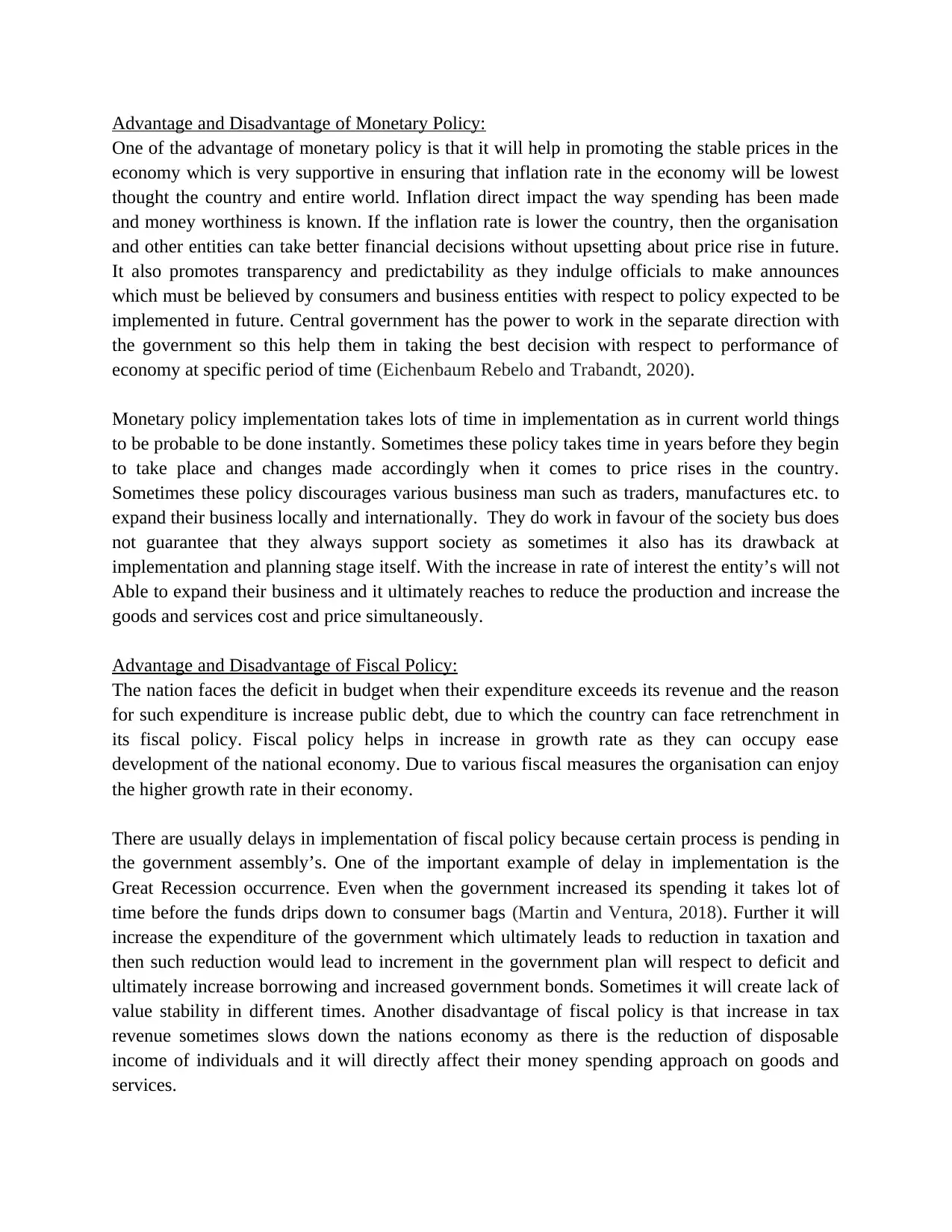
Advantage and Disadvantage of Monetary Policy:
One of the advantage of monetary policy is that it will help in promoting the stable prices in the
economy which is very supportive in ensuring that inflation rate in the economy will be lowest
thought the country and entire world. Inflation direct impact the way spending has been made
and money worthiness is known. If the inflation rate is lower the country, then the organisation
and other entities can take better financial decisions without upsetting about price rise in future.
It also promotes transparency and predictability as they indulge officials to make announces
which must be believed by consumers and business entities with respect to policy expected to be
implemented in future. Central government has the power to work in the separate direction with
the government so this help them in taking the best decision with respect to performance of
economy at specific period of time (Eichenbaum Rebelo and Trabandt, 2020).
Monetary policy implementation takes lots of time in implementation as in current world things
to be probable to be done instantly. Sometimes these policy takes time in years before they begin
to take place and changes made accordingly when it comes to price rises in the country.
Sometimes these policy discourages various business man such as traders, manufactures etc. to
expand their business locally and internationally. They do work in favour of the society bus does
not guarantee that they always support society as sometimes it also has its drawback at
implementation and planning stage itself. With the increase in rate of interest the entity’s will not
Able to expand their business and it ultimately reaches to reduce the production and increase the
goods and services cost and price simultaneously.
Advantage and Disadvantage of Fiscal Policy:
The nation faces the deficit in budget when their expenditure exceeds its revenue and the reason
for such expenditure is increase public debt, due to which the country can face retrenchment in
its fiscal policy. Fiscal policy helps in increase in growth rate as they can occupy ease
development of the national economy. Due to various fiscal measures the organisation can enjoy
the higher growth rate in their economy.
There are usually delays in implementation of fiscal policy because certain process is pending in
the government assembly’s. One of the important example of delay in implementation is the
Great Recession occurrence. Even when the government increased its spending it takes lot of
time before the funds drips down to consumer bags (Martin and Ventura, 2018). Further it will
increase the expenditure of the government which ultimately leads to reduction in taxation and
then such reduction would lead to increment in the government plan will respect to deficit and
ultimately increase borrowing and increased government bonds. Sometimes it will create lack of
value stability in different times. Another disadvantage of fiscal policy is that increase in tax
revenue sometimes slows down the nations economy as there is the reduction of disposable
income of individuals and it will directly affect their money spending approach on goods and
services.
One of the advantage of monetary policy is that it will help in promoting the stable prices in the
economy which is very supportive in ensuring that inflation rate in the economy will be lowest
thought the country and entire world. Inflation direct impact the way spending has been made
and money worthiness is known. If the inflation rate is lower the country, then the organisation
and other entities can take better financial decisions without upsetting about price rise in future.
It also promotes transparency and predictability as they indulge officials to make announces
which must be believed by consumers and business entities with respect to policy expected to be
implemented in future. Central government has the power to work in the separate direction with
the government so this help them in taking the best decision with respect to performance of
economy at specific period of time (Eichenbaum Rebelo and Trabandt, 2020).
Monetary policy implementation takes lots of time in implementation as in current world things
to be probable to be done instantly. Sometimes these policy takes time in years before they begin
to take place and changes made accordingly when it comes to price rises in the country.
Sometimes these policy discourages various business man such as traders, manufactures etc. to
expand their business locally and internationally. They do work in favour of the society bus does
not guarantee that they always support society as sometimes it also has its drawback at
implementation and planning stage itself. With the increase in rate of interest the entity’s will not
Able to expand their business and it ultimately reaches to reduce the production and increase the
goods and services cost and price simultaneously.
Advantage and Disadvantage of Fiscal Policy:
The nation faces the deficit in budget when their expenditure exceeds its revenue and the reason
for such expenditure is increase public debt, due to which the country can face retrenchment in
its fiscal policy. Fiscal policy helps in increase in growth rate as they can occupy ease
development of the national economy. Due to various fiscal measures the organisation can enjoy
the higher growth rate in their economy.
There are usually delays in implementation of fiscal policy because certain process is pending in
the government assembly’s. One of the important example of delay in implementation is the
Great Recession occurrence. Even when the government increased its spending it takes lot of
time before the funds drips down to consumer bags (Martin and Ventura, 2018). Further it will
increase the expenditure of the government which ultimately leads to reduction in taxation and
then such reduction would lead to increment in the government plan will respect to deficit and
ultimately increase borrowing and increased government bonds. Sometimes it will create lack of
value stability in different times. Another disadvantage of fiscal policy is that increase in tax
revenue sometimes slows down the nations economy as there is the reduction of disposable
income of individuals and it will directly affect their money spending approach on goods and
services.
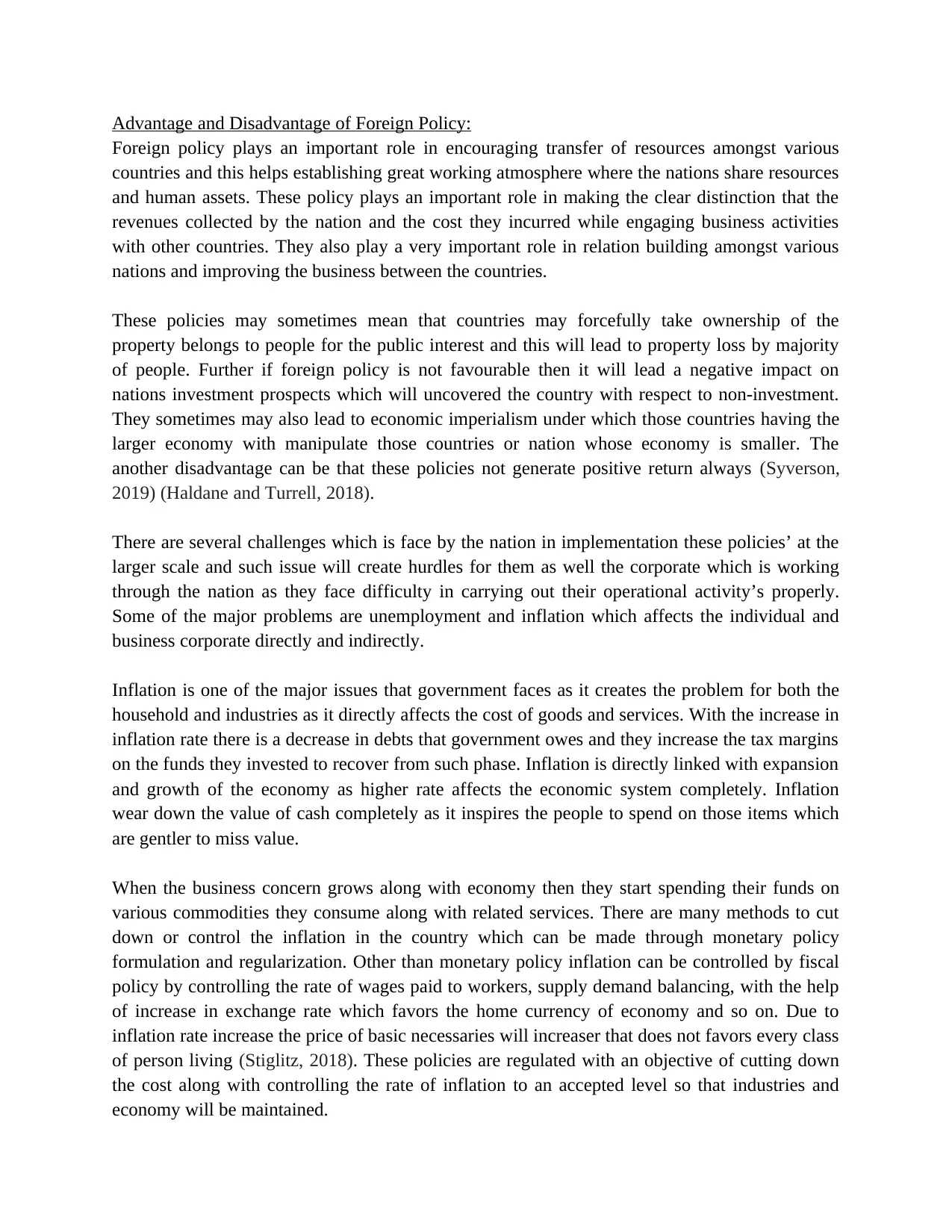
Advantage and Disadvantage of Foreign Policy:
Foreign policy plays an important role in encouraging transfer of resources amongst various
countries and this helps establishing great working atmosphere where the nations share resources
and human assets. These policy plays an important role in making the clear distinction that the
revenues collected by the nation and the cost they incurred while engaging business activities
with other countries. They also play a very important role in relation building amongst various
nations and improving the business between the countries.
These policies may sometimes mean that countries may forcefully take ownership of the
property belongs to people for the public interest and this will lead to property loss by majority
of people. Further if foreign policy is not favourable then it will lead a negative impact on
nations investment prospects which will uncovered the country with respect to non-investment.
They sometimes may also lead to economic imperialism under which those countries having the
larger economy with manipulate those countries or nation whose economy is smaller. The
another disadvantage can be that these policies not generate positive return always (Syverson,
2019) (Haldane and Turrell, 2018).
There are several challenges which is face by the nation in implementation these policies’ at the
larger scale and such issue will create hurdles for them as well the corporate which is working
through the nation as they face difficulty in carrying out their operational activity’s properly.
Some of the major problems are unemployment and inflation which affects the individual and
business corporate directly and indirectly.
Inflation is one of the major issues that government faces as it creates the problem for both the
household and industries as it directly affects the cost of goods and services. With the increase in
inflation rate there is a decrease in debts that government owes and they increase the tax margins
on the funds they invested to recover from such phase. Inflation is directly linked with expansion
and growth of the economy as higher rate affects the economic system completely. Inflation
wear down the value of cash completely as it inspires the people to spend on those items which
are gentler to miss value.
When the business concern grows along with economy then they start spending their funds on
various commodities they consume along with related services. There are many methods to cut
down or control the inflation in the country which can be made through monetary policy
formulation and regularization. Other than monetary policy inflation can be controlled by fiscal
policy by controlling the rate of wages paid to workers, supply demand balancing, with the help
of increase in exchange rate which favors the home currency of economy and so on. Due to
inflation rate increase the price of basic necessaries will increaser that does not favors every class
of person living (Stiglitz, 2018). These policies are regulated with an objective of cutting down
the cost along with controlling the rate of inflation to an accepted level so that industries and
economy will be maintained.
Foreign policy plays an important role in encouraging transfer of resources amongst various
countries and this helps establishing great working atmosphere where the nations share resources
and human assets. These policy plays an important role in making the clear distinction that the
revenues collected by the nation and the cost they incurred while engaging business activities
with other countries. They also play a very important role in relation building amongst various
nations and improving the business between the countries.
These policies may sometimes mean that countries may forcefully take ownership of the
property belongs to people for the public interest and this will lead to property loss by majority
of people. Further if foreign policy is not favourable then it will lead a negative impact on
nations investment prospects which will uncovered the country with respect to non-investment.
They sometimes may also lead to economic imperialism under which those countries having the
larger economy with manipulate those countries or nation whose economy is smaller. The
another disadvantage can be that these policies not generate positive return always (Syverson,
2019) (Haldane and Turrell, 2018).
There are several challenges which is face by the nation in implementation these policies’ at the
larger scale and such issue will create hurdles for them as well the corporate which is working
through the nation as they face difficulty in carrying out their operational activity’s properly.
Some of the major problems are unemployment and inflation which affects the individual and
business corporate directly and indirectly.
Inflation is one of the major issues that government faces as it creates the problem for both the
household and industries as it directly affects the cost of goods and services. With the increase in
inflation rate there is a decrease in debts that government owes and they increase the tax margins
on the funds they invested to recover from such phase. Inflation is directly linked with expansion
and growth of the economy as higher rate affects the economic system completely. Inflation
wear down the value of cash completely as it inspires the people to spend on those items which
are gentler to miss value.
When the business concern grows along with economy then they start spending their funds on
various commodities they consume along with related services. There are many methods to cut
down or control the inflation in the country which can be made through monetary policy
formulation and regularization. Other than monetary policy inflation can be controlled by fiscal
policy by controlling the rate of wages paid to workers, supply demand balancing, with the help
of increase in exchange rate which favors the home currency of economy and so on. Due to
inflation rate increase the price of basic necessaries will increaser that does not favors every class
of person living (Stiglitz, 2018). These policies are regulated with an objective of cutting down
the cost along with controlling the rate of inflation to an accepted level so that industries and
economy will be maintained.
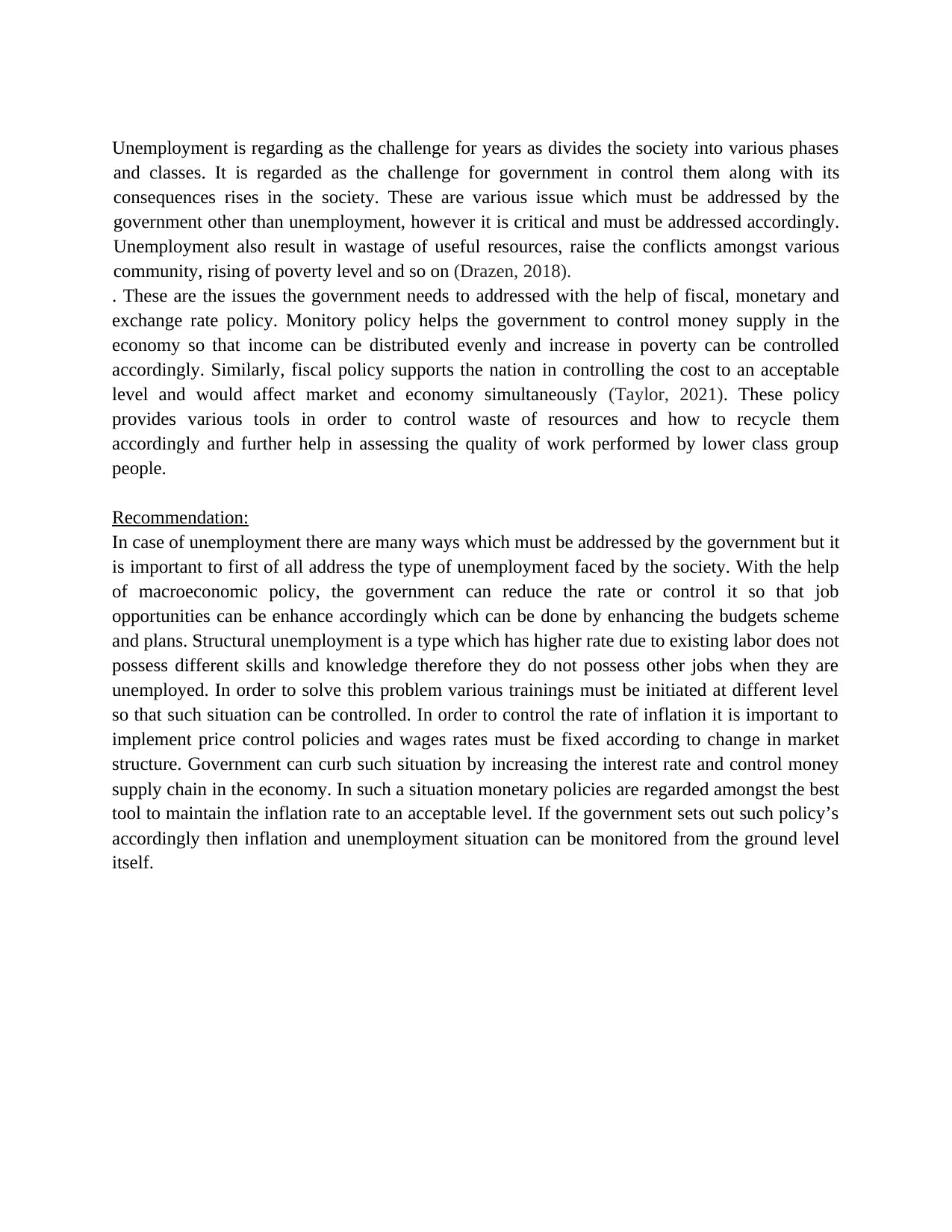
Unemployment is regarding as the challenge for years as divides the society into various phases
and classes. It is regarded as the challenge for government in control them along with its
consequences rises in the society. These are various issue which must be addressed by the
government other than unemployment, however it is critical and must be addressed accordingly.
Unemployment also result in wastage of useful resources, raise the conflicts amongst various
community, rising of poverty level and so on (Drazen, 2018).
. These are the issues the government needs to addressed with the help of fiscal, monetary and
exchange rate policy. Monitory policy helps the government to control money supply in the
economy so that income can be distributed evenly and increase in poverty can be controlled
accordingly. Similarly, fiscal policy supports the nation in controlling the cost to an acceptable
level and would affect market and economy simultaneously (Taylor, 2021). These policy
provides various tools in order to control waste of resources and how to recycle them
accordingly and further help in assessing the quality of work performed by lower class group
people.
Recommendation:
In case of unemployment there are many ways which must be addressed by the government but it
is important to first of all address the type of unemployment faced by the society. With the help
of macroeconomic policy, the government can reduce the rate or control it so that job
opportunities can be enhance accordingly which can be done by enhancing the budgets scheme
and plans. Structural unemployment is a type which has higher rate due to existing labor does not
possess different skills and knowledge therefore they do not possess other jobs when they are
unemployed. In order to solve this problem various trainings must be initiated at different level
so that such situation can be controlled. In order to control the rate of inflation it is important to
implement price control policies and wages rates must be fixed according to change in market
structure. Government can curb such situation by increasing the interest rate and control money
supply chain in the economy. In such a situation monetary policies are regarded amongst the best
tool to maintain the inflation rate to an acceptable level. If the government sets out such policy’s
accordingly then inflation and unemployment situation can be monitored from the ground level
itself.
and classes. It is regarded as the challenge for government in control them along with its
consequences rises in the society. These are various issue which must be addressed by the
government other than unemployment, however it is critical and must be addressed accordingly.
Unemployment also result in wastage of useful resources, raise the conflicts amongst various
community, rising of poverty level and so on (Drazen, 2018).
. These are the issues the government needs to addressed with the help of fiscal, monetary and
exchange rate policy. Monitory policy helps the government to control money supply in the
economy so that income can be distributed evenly and increase in poverty can be controlled
accordingly. Similarly, fiscal policy supports the nation in controlling the cost to an acceptable
level and would affect market and economy simultaneously (Taylor, 2021). These policy
provides various tools in order to control waste of resources and how to recycle them
accordingly and further help in assessing the quality of work performed by lower class group
people.
Recommendation:
In case of unemployment there are many ways which must be addressed by the government but it
is important to first of all address the type of unemployment faced by the society. With the help
of macroeconomic policy, the government can reduce the rate or control it so that job
opportunities can be enhance accordingly which can be done by enhancing the budgets scheme
and plans. Structural unemployment is a type which has higher rate due to existing labor does not
possess different skills and knowledge therefore they do not possess other jobs when they are
unemployed. In order to solve this problem various trainings must be initiated at different level
so that such situation can be controlled. In order to control the rate of inflation it is important to
implement price control policies and wages rates must be fixed according to change in market
structure. Government can curb such situation by increasing the interest rate and control money
supply chain in the economy. In such a situation monetary policies are regarded amongst the best
tool to maintain the inflation rate to an acceptable level. If the government sets out such policy’s
accordingly then inflation and unemployment situation can be monitored from the ground level
itself.
Paraphrase This Document
Need a fresh take? Get an instant paraphrase of this document with our AI Paraphraser
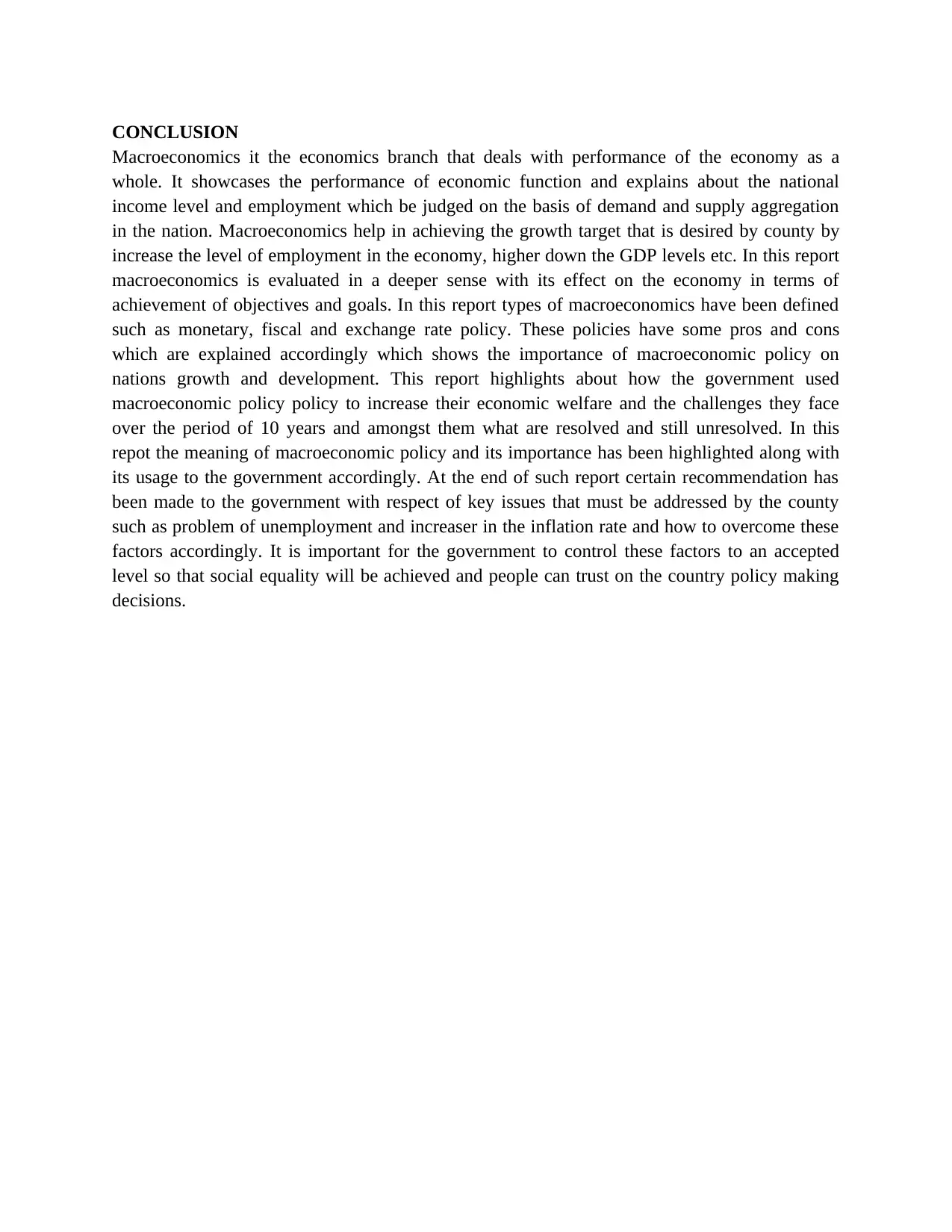
CONCLUSION
Macroeconomics it the economics branch that deals with performance of the economy as a
whole. It showcases the performance of economic function and explains about the national
income level and employment which be judged on the basis of demand and supply aggregation
in the nation. Macroeconomics help in achieving the growth target that is desired by county by
increase the level of employment in the economy, higher down the GDP levels etc. In this report
macroeconomics is evaluated in a deeper sense with its effect on the economy in terms of
achievement of objectives and goals. In this report types of macroeconomics have been defined
such as monetary, fiscal and exchange rate policy. These policies have some pros and cons
which are explained accordingly which shows the importance of macroeconomic policy on
nations growth and development. This report highlights about how the government used
macroeconomic policy policy to increase their economic welfare and the challenges they face
over the period of 10 years and amongst them what are resolved and still unresolved. In this
repot the meaning of macroeconomic policy and its importance has been highlighted along with
its usage to the government accordingly. At the end of such report certain recommendation has
been made to the government with respect of key issues that must be addressed by the county
such as problem of unemployment and increaser in the inflation rate and how to overcome these
factors accordingly. It is important for the government to control these factors to an accepted
level so that social equality will be achieved and people can trust on the country policy making
decisions.
Macroeconomics it the economics branch that deals with performance of the economy as a
whole. It showcases the performance of economic function and explains about the national
income level and employment which be judged on the basis of demand and supply aggregation
in the nation. Macroeconomics help in achieving the growth target that is desired by county by
increase the level of employment in the economy, higher down the GDP levels etc. In this report
macroeconomics is evaluated in a deeper sense with its effect on the economy in terms of
achievement of objectives and goals. In this report types of macroeconomics have been defined
such as monetary, fiscal and exchange rate policy. These policies have some pros and cons
which are explained accordingly which shows the importance of macroeconomic policy on
nations growth and development. This report highlights about how the government used
macroeconomic policy policy to increase their economic welfare and the challenges they face
over the period of 10 years and amongst them what are resolved and still unresolved. In this
repot the meaning of macroeconomic policy and its importance has been highlighted along with
its usage to the government accordingly. At the end of such report certain recommendation has
been made to the government with respect of key issues that must be addressed by the county
such as problem of unemployment and increaser in the inflation rate and how to overcome these
factors accordingly. It is important for the government to control these factors to an accepted
level so that social equality will be achieved and people can trust on the country policy making
decisions.
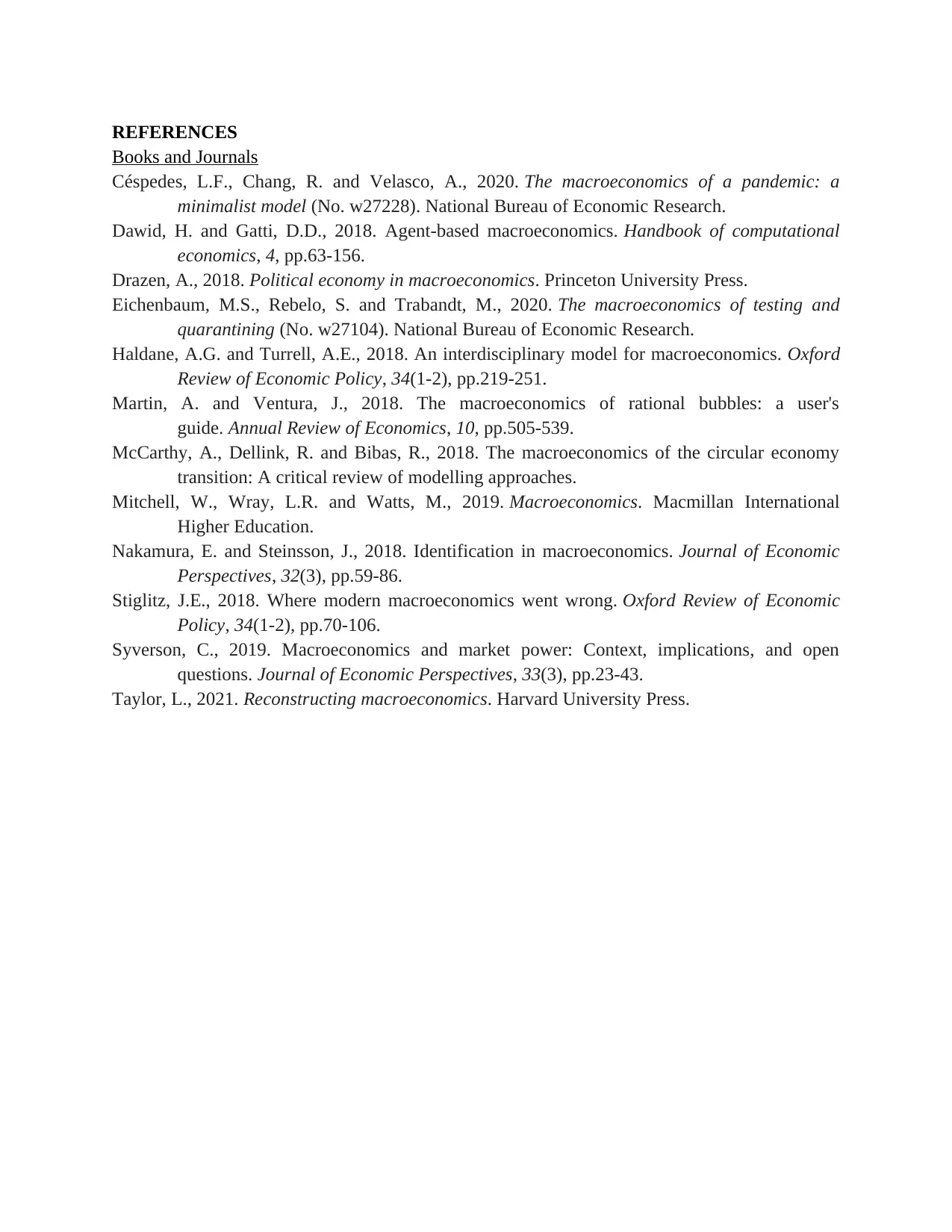
REFERENCES
Books and Journals
Céspedes, L.F., Chang, R. and Velasco, A., 2020. The macroeconomics of a pandemic: a
minimalist model (No. w27228). National Bureau of Economic Research.
Dawid, H. and Gatti, D.D., 2018. Agent-based macroeconomics. Handbook of computational
economics, 4, pp.63-156.
Drazen, A., 2018. Political economy in macroeconomics. Princeton University Press.
Eichenbaum, M.S., Rebelo, S. and Trabandt, M., 2020. The macroeconomics of testing and
quarantining (No. w27104). National Bureau of Economic Research.
Haldane, A.G. and Turrell, A.E., 2018. An interdisciplinary model for macroeconomics. Oxford
Review of Economic Policy, 34(1-2), pp.219-251.
Martin, A. and Ventura, J., 2018. The macroeconomics of rational bubbles: a user's
guide. Annual Review of Economics, 10, pp.505-539.
McCarthy, A., Dellink, R. and Bibas, R., 2018. The macroeconomics of the circular economy
transition: A critical review of modelling approaches.
Mitchell, W., Wray, L.R. and Watts, M., 2019. Macroeconomics. Macmillan International
Higher Education.
Nakamura, E. and Steinsson, J., 2018. Identification in macroeconomics. Journal of Economic
Perspectives, 32(3), pp.59-86.
Stiglitz, J.E., 2018. Where modern macroeconomics went wrong. Oxford Review of Economic
Policy, 34(1-2), pp.70-106.
Syverson, C., 2019. Macroeconomics and market power: Context, implications, and open
questions. Journal of Economic Perspectives, 33(3), pp.23-43.
Taylor, L., 2021. Reconstructing macroeconomics. Harvard University Press.
Books and Journals
Céspedes, L.F., Chang, R. and Velasco, A., 2020. The macroeconomics of a pandemic: a
minimalist model (No. w27228). National Bureau of Economic Research.
Dawid, H. and Gatti, D.D., 2018. Agent-based macroeconomics. Handbook of computational
economics, 4, pp.63-156.
Drazen, A., 2018. Political economy in macroeconomics. Princeton University Press.
Eichenbaum, M.S., Rebelo, S. and Trabandt, M., 2020. The macroeconomics of testing and
quarantining (No. w27104). National Bureau of Economic Research.
Haldane, A.G. and Turrell, A.E., 2018. An interdisciplinary model for macroeconomics. Oxford
Review of Economic Policy, 34(1-2), pp.219-251.
Martin, A. and Ventura, J., 2018. The macroeconomics of rational bubbles: a user's
guide. Annual Review of Economics, 10, pp.505-539.
McCarthy, A., Dellink, R. and Bibas, R., 2018. The macroeconomics of the circular economy
transition: A critical review of modelling approaches.
Mitchell, W., Wray, L.R. and Watts, M., 2019. Macroeconomics. Macmillan International
Higher Education.
Nakamura, E. and Steinsson, J., 2018. Identification in macroeconomics. Journal of Economic
Perspectives, 32(3), pp.59-86.
Stiglitz, J.E., 2018. Where modern macroeconomics went wrong. Oxford Review of Economic
Policy, 34(1-2), pp.70-106.
Syverson, C., 2019. Macroeconomics and market power: Context, implications, and open
questions. Journal of Economic Perspectives, 33(3), pp.23-43.
Taylor, L., 2021. Reconstructing macroeconomics. Harvard University Press.
1 out of 9
Related Documents
Your All-in-One AI-Powered Toolkit for Academic Success.
+13062052269
info@desklib.com
Available 24*7 on WhatsApp / Email
![[object Object]](/_next/static/media/star-bottom.7253800d.svg)
Unlock your academic potential
© 2024 | Zucol Services PVT LTD | All rights reserved.



